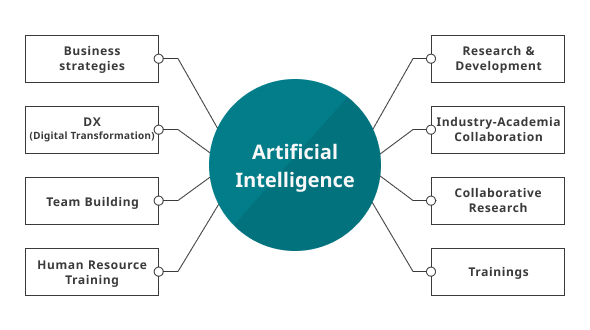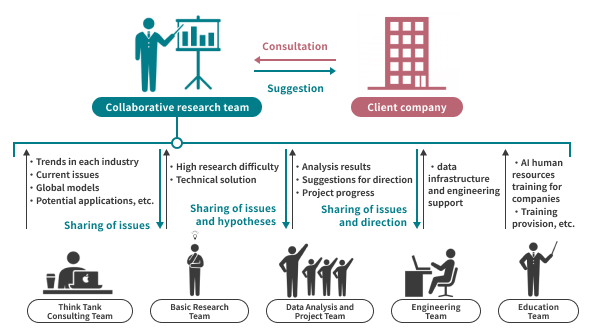Collaboration
Collaborative Research
– We work on projects to contribute to businesses.-
Matsuo Laboratory conducts joint research with multiple companies.
Our goal is not only to bring great value to society by applying the latest research and technology to business but also to accelerate research and development by leveraging the real-world data reservoirs companies have.
Matsuo Lab’s technology is available to companies
One-stop solution for issues related to artificial intelligence

Team infrastructure dedicated to solving complex and challenging problems

Technical capabilities to implement cutting-edge findings from the leading AI research papers

As a leading research institute on fundamental AI research, Matsuo Lab can implement the latest technologies in line with the company’s specific needs.
We propose and provide optimal solutions based on the latest research on the ever-evolving AI technology.
Please feel free to request a consultation for business R&D support.
Social implementation capabilities cultivated through more than 10 years of joint research

Matsuo Lab is oriented toward creating business impact, and we have been conducting joint research with various industries for more than 10 years.
We provide our partner companies with the necessary technology to drive meaningful business results.
We also provide consultation and Proof of Concept (PoC) services to companies grappling with how to effectively utilize AI.
Case Introduction
Please contact us if you have any requests for a joint research interview, joining our laboratory, or if you wish to discuss web technologies, artificial intelligence, or entrepreneurship.

Wealth Navi
In collaboration with Wealth Navi, Inc., the goal is to use AI to help humans successfully manage their assets over the long term without falling into psychological traps.

DSB
In collaboration with Daiko Securities Business, we are researching and developing technology to automatically screen securities transactions to meet the increasingly complex realities of securities trading, which are becoming more complex with the spread of ultra-high-speed trading.

Mizuho Bank
This is a joint research project with Mizuho Bank regarding the sophistication of foreign exchange transactions using AI.
The objective of this research is to refine the execution of foreign exchange transactions by analyzing foreign exchange transaction data using AI to speed up transactions, increase transaction volume, minimize foreign exchange risks, and maximize profits.

Nikkei
In collaboration with Nihon Keizai Shimbun, we are researching and developing an algorithm to automatically generate flash reports from earnings reports periodically published by listed companies.

CCC
Based on CCC’s large amount of pos data with IDs, we did not simply come up with a recommendation algorithm for similar products, but worked toward elucidating consumer intelligence by constructing a recommendation algorithm that takes into account the customer’s tastes, standardization, and maturity level.

DeepZenGo
Deep Zen Go is a project related to Go AI using deep learning.
Led by Ojima and Kato, who have been developing the Go AI zen, Dwango Inc., Nihon Ki-in, and Matsuo Laboratory are collaborating in the research and development.

study supplement
This is one of our ongoing projects in collaboration with Recruit Co.
We are conducting a model analysis of learners in “Examination Supplement,” a study support service for university entrance examinations.
We aim to identify service elements that contribute to continuous learning using opportunity learning and other methods, and to realize a mechanism that encourages continuous use of the service.

wellness
We collect and structure medical and welfare related information on the web.
The goal is to mine, process, and create a database of data that is publicly available but difficult to obtain because it is provided in a variety of formats.
This project is currently ongoing in collaboration with Wellness, Inc.

SUUMO
The Sumo project is one of our joint research projects with Recruit Co.
We conducted data mining based on access logs within Sumo.
In this research, we focused on the characteristics of real estate as a commercial product (long consideration period, every house is a different product) and proposed a recommendation algorithm accordingly.

Election Analysis
This is an analysis of Twitter usage by candidates in the 2013 House of Councillors election, the first national election in which the ban on Internet campaigning was lifted.
We visualized the network of candidate relationships based on follower co-occurrence analysis and quantified the candidate’s ability to spread the word. The analysis was conducted in collaboration with the Asahi Shimbun newspaper, and the results were published in VirioMedia and reported nationwide.

Zexy.net
Using usage log data from Japan’s largest wedding information site, “ZEXY,” we worked on the research and development of a recommendation engine that accurately captures user preferences across product categories.
The research results were not only utilized in the development of a recommendation engine for the actual site, but were also accepted for publication in the Journal of IEICE.

WACUL
(WACUL), an artificial intelligence website analysis company, to research a machine learning system that makes advanced website improvement proposals.
Our goal is to optimize websites by capturing the characteristics of each web page, rather than just comparing the closing rate of each web page.

social gear
We use log information from Facebook ads to forecast the future, including the number of Conversions for each Adset.Our goal is to optimize budget portfolios and advertising operations by predicting the future performance of Adsets.
We are researching daily to achieve higher accuracy by referring to competitions such as kaggle.

DWANGO
We are conducting various data analyses using the logs of Nico Nico Douga videos.
Specifically, we are visualizing macro user viewing transitions, testing hypotheses on patterns of user transitions, and predicting the content of the next video viewed.

ASIA TREND MAP
We use large-scale social media data such as Wikipedia and Twitter to analyze how entertainment content is trending in different countries.
We also aim to discover predictive signs that trigger trends in big data and predict future trends